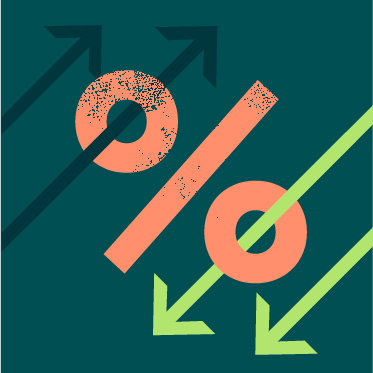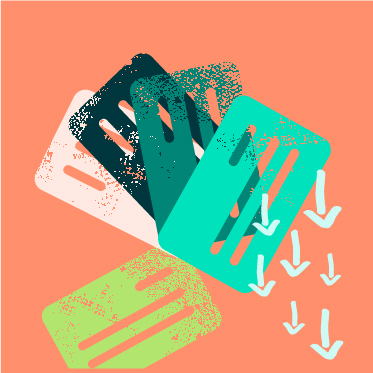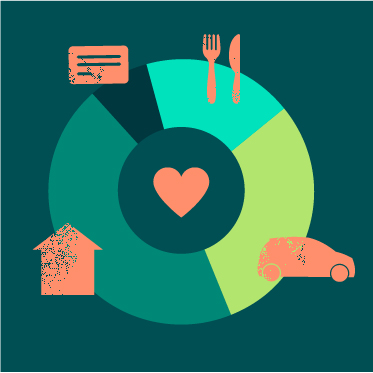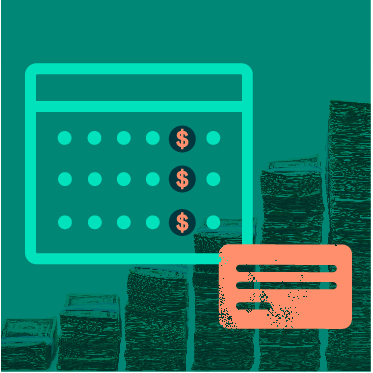4 Strategies to Pay Off Holiday Debt
January 6, 2020 • 5 minute read
Paying down holiday debt quickly can make a big difference.
The holiday season may end in December, but the credit card bills often stay with people all year long. According to a 2018 survey, consumers took on $1,230 of debt on average during the holiday season, but only about 11% planned to pay off their bills a month later. Nearly half of consumers (49%) said it would take five months or longer to finish paying for their holiday spending.1
With that amount of debt, if you made a minimum payment of $30 on your credit card each month — and it came with the average 16.97% Annual Percentage Rate (APR)2 — you would pay over $600 in interest.
If you put your purchases on retail store credit cards, which carry an average interest rate of about 26.01% on average3 you would end up paying more than $1,800 in interest.
Paying off credit card debt as quickly as possible is key to saving money, but where do you start? While some parts of your budget are nonnegotiable — you still need to buy groceries, and pay rent, for example — there are other changes you can make that will help reduce the amount of money you spend on interest from credit card debt.

Pay attention to credit card interest rates.
Even when interest rates are high, credit card issuers sometimes offer deals that allow you to transfer credit card debt to another card with a lower rate. But before you take a credit card issuer up on an offer for a new balance transfer card, there are a few questions you need to ask to determine if it’s the right match for your financial needs.
If you plan to transfer a large balance from a credit card with a high interest rate to a newly opened credit card, you’ll want to make sure the new rate is actually lower than what you’re already paying. New credit cards often come with a low or 0% promotional rate for a set amount of time after the card is issued. So you may be able to get by for several months paying no interest. But be sure you know how long the low-interest rate lasts — and what the interest rate will be once the introductory period ends. Knowing these details will enable you to calculate your potential savings.
Another thing to consider before you transfer your balance to a new card offering one of these promotional rates is the transfer fee. If the fee is very high, or if you have multiple debts you want to transfer, the cost may outweigh the benefit of the low rate.
The less time you take to pay off your balance, the less interest you’ll pay. For instance, if you have to pay off $1,000 at an 18% APR, you’ll pay about $42 in interest over a five-month period. But if you pay off your balance over an eight-month period, you'll pay about $64 in interest.
It's important to set yourself a five-month or six-month deadline. Having a deadline to meet can focus your mind and motivate you to work harder to meet your goal. It will also help you understand the importance of not paying too much interest.

Set up a system to pay off multiple cards.
If you have more than one high-interest card to pay off, you need to rank them in order of the interest rates they charge. While you may need to make the minimum payments on most of your cards, you should pay much more on the card that charges the highest rate of interest.
Here, as well, you need to set yourself a deadline. Without a deadline, you're likely to go too easy on yourself and keep your debt going forever.
Make small payments each week.
While your credit card issuer may only send you a bill once a month, don’t assume that's the only time interest is calculated on what you owe. Your interest is calculated every day.
This means if you pay whatever you can on your credit card debt every day, it will go to work for you right away to lower your interest bill. If you pay $50 a week instead of $200 at the end of the month, you will save on the interest that you would otherwise pay on the $50 each week.
It can also help you pay off your holiday debt faster to get on a plan of self-denial. It's a good idea to deny yourself restaurant meals, movie outings, shopping trips and visits to your local brewpub. You can send every bit of money that you save to your credit card issuer.

Learn to enjoy budgeting.
You'll never know how much you can afford to pay on your credit card bill every month unless you have a budget. Every bit of money you owe on a credit card is money you pay interest on. You need to carefully draw up your budget for the month, calculate how much money you have leftover, set aside enough for an emergency fund and direct all the rest to your credit cards.
Learning to live your life according to a budget can seem difficult at first, especially when everyone you know seems to be out having a good time. However, it’s important to understand that everyone’s financial situation is unique, and those people could be living on borrowed money.

If you don't want to play that game, you should begin enjoying the feeling of responsibility and surety that comes with living life to a budget. Being responsible is its own reward.
Paying off your holiday debt in a reasonable amount of time takes a change of attitude. If you've never been responsible with your credit card debt, getting started can be an ordeal — but it’s worth it.
Consider signing up for a credit card counseling class or a financial wellness program. You'll be able to see and talk to other people who work hard on their budgets and on paying their credit cards off. Over time, you’ll build healthier financial habits, and the sacrifices you make will seem much easier.
Save on interest
Pay off holiday debt and save on interest.
Enjoy a 0% introductory rate on balance transfers for six months and no annual fee with the WSECU Low Rate Visa® card.*
Sources text
Sources:
